
As geopolitical tensions rise in nuclear-armed states, we start wondering what would happen if a nuclear war started. The horrific devastation and suffering witnessed in Hiroshima and Nagasaki in 1945 warn us of the dangers of such a nuclear war. At that time different organizations began documenting the effects of the nuclear explosions on human health, and the environment. The blast wave, the thermal wave, and the radiation generated by nuclear explosions have devastating short and long-term effects on the human body.
The use of about 100 nuclear weapons against urban targets would spread radiation around the planet, and also lead to a cooling of the atmosphere, and shorter growing seasons. That would have food shortages and a global famine as consequences.
The effect of one bomb being dropped on a capital city would have disastrous consequences. It would lead to destruction and contamination, and it would cause profound social and political disruption. Several decades would be necessary to reconstruct the infrastructure and regenerate economic activities.

The direct impact of an explosion would be the death of tens of millions of people. Smoke from the burnt cities would rise into the atmosphere, and block the rays of the sun. Many talk about the 'nuclear winter' which is a severe global cooling that would be generated by the smoke. On a planet that has so many problems related to pollution and environmental changes, such a climate change would be devastating.
But what are the stages of a nuclear explosion? Like any other explosion, a nuclear bomb would create an air blast that would destroy buildings which in turn would injure and kill people. The direct shock wave would injure humans, by rupturing organs and hurling them at high speed. The explosion generates an intense pulse of thermal radiation that can start fires and burn the skin. A person in the vicinity of the blast would be roasted alive, dying a slow, painful death. The fires ignited by the explosion can create a firestorm, preventing survivors from escaping. Large amounts of neutron and gamma radiation would be released.

Soil would mix with the highly radioactive particles from the weapon. The debris would be carried by the wind and fall back to Earth over a period of minutes to hours. In this last stage, the radiation dose would be delivered over an extended period. The inhalation of contaminated air and consumption of contaminated water and food would increase the dose of radiation received by victims.
But the long-term effects would be just as bad. Cancer, cataracts, thyroid disease, and birth defects would be just a small sample of those conditions that would affect human health.

The radiation from a nuclear bomb is of two types, non-ionizing and ionizing. The non-ionizing radiation like microwaves can cause thermal burns. The ionizing radiation is more dangerous and can cause cell death, DNA errors, and its effects last for years. This includes X-rays, gamma rays, positrons, and neutrons.
Reduced effects on health are observed with people staying indoors for the next 80 days after the explosion, due to the fact that this is the period for the decay of the most dangerous isotope, called Iodine-131.
It is considered that another, indirect long-term effect of a nuclear war would be the increase in infectious diseases. This would be due to the poor living conditions, and lack of medical care and vaccination, as a consequence of the war.

Some of the world's stockpiles of nuclear weapons are dropping, due to the fact that more nations understand the consequences that such a war would have on the fate of our planet. But with many thousands of warheads still in existence, and with more nations becoming nuclear powers, some people consider that nuclear war remains a threat.






Comments
There are no comments for this story
Be the first to respond and start the conversation.